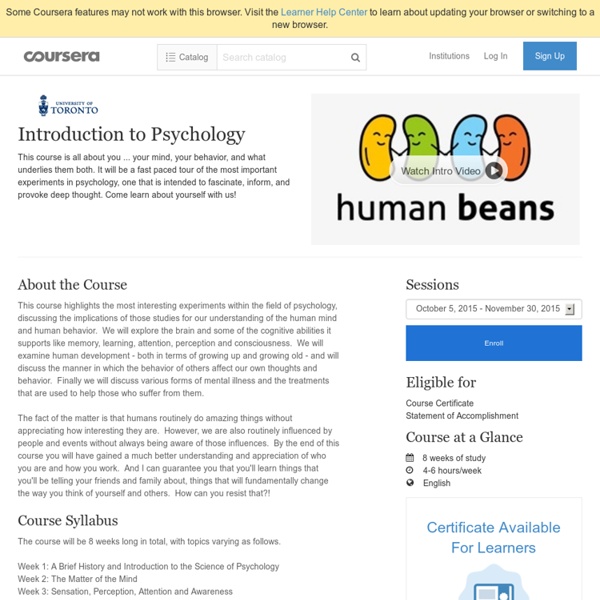Appel Burnout
Logic: Language and Information 1
About the Course Information is everywhere: in our words and our world, our thoughts and our theories, our devices and our databases. Logic is the study of that information: the features it has, how it’s represented, and how we can manipulate it. Does this hypothesis clash with the evidence we have or is it consistent with the evidence? If you take this subject, you will learn how to use the core tools in logic: the idea of a formal language, which gives us a way to talk about logical structure; and we'll introduce and explain the central logical concepts such as consistency and validity; models; and proofs. Course Syllabus Week 1. Week 2. Weeks 3–5. Electronic Engineering — simplifying digital circuitsPhilosophy — vagueness and borderline casesComputer Science — databases, resolution and propositional PrologLinguistics — meaning: implication vs implicature Recommended Background This subject presumes no specialist background knowledge. Suggested Readings Course Format
Fédération Française de psychothérapie et psychanalyse - FF2P - Accueil
17/01/20 - 11e journée d'étude : Compte-rendu 11/01/20 - 34e colloque : Le colloque est annulé ! Les conditions ne sont malheureusement pas réunies pour que nous puissions maintenir l'organisation de ce colloque 11/12/19 - 34e colloque : Prise en charge de "L'éco anxiété", par Charline SCHMERBER (article paru dans la revue Reporterre) 19/11/19 - Guide Prévenir la maltraitance : informations préoccupantes et signalements 09/11/19 - 12e journée d'étude : Brochure de la journée 08/11/19 - 12e journée d'étude : Tribune libre de JD BILLIOTTE 05/11/19 - Liste des candidats au conseil d'administration de la FF2P (Assemblée Générale du 16/11/2019) 17/09/19 - Mise en ligne du Code de déontologie de l'EAP 24/05/19 - Pierre Canouï, président d'honneur de la FF2P, était l'invité de Nagui sur France Inter dans son émission "La Bande Originale".
Introduction to Philosophy
This course will introduce you to some of the main areas of research in contemporary philosophy. Each module a different philosopher will talk you through some of the most important questions and issues in their area of expertise. We’ll begin by trying to understand what philosophy is – what are its characteristic aims and methods, and how does it differ from other subjects?
Qu’est ce que la relaxation bio-dynamique, où pratiquer à Grenoble, comment se former ? - Formation et méthode de relaxation, santé et bien-être dans son corps Ressource attitude
Partage la vidéo !… La relaxation bio-dynamique est un ensemble de pratiques corporelles dont le concept, réalisé par Pierre Pyronnet, a été déposé en 1987. Après 35 années de pratique des arts martiaux, (judo, aïkido, kung-fu, yoga, taï-chi-chuan,…). Dans les années 1990, il décide de réunir l’essentiel de sa pratique corporelle pour la mettre au service de ceux qui veulent se sentir mieux dans leur corps... Cette pratique, utilisée a l’origine dans les arts martiaux, est issue des arts énergétiques internes et corporels. • Au delà du cadre des arts martiaux, Pierre Pyronnet a développé sa méthode notamment dans le domaine des animations de voyage, (croisières Paquet, Costa…), puis dès 1998 vers tous types de publics, (sportifs, personnes âgées, monde professionnel…). • Sur une durée de 50 à 60 minutes, cette pratique se déroule selon trois phases : position debout, allongée et assise. Découvrez ces liens : Toute l’histoire de la Relaxation Bio-dynamique ! Informations et contact x xxx
English Composition I: Achieving Expertise
About the Course English Composition I provides an introduction to and foundation for the academic reading and writing characteristic of college. Attending explicitly to disciplinary context, you will learn to read critically, write effective arguments, understand the writing process, and craft powerful prose that meets readers’ expectations. You will gain writing expertise by exploring questions about expertise itself: What factors impact expert achievement? Two overarching assumptions about academic writing will shape our work: 1) it is transferable; 2) it is learnable. Share why you want to improve your writing Learn what other says about their motivations **English Composition I has earned a Certificate of Recognition from Quality Matters, a non-profit dedicated to quality in online education Course Syllabus Unit 1 (Weeks 1-3): Critical ReviewHow do we become experts? Recommended Background In-course Textbooks Suggested Readings Course Format Yes. Will I get feedback on my written work? No.
Psychothérapie_Interpersonnelle
Ideas of the Twentieth Century
The last century ushered in significant progress. Philosophers, scientists, artists, and poets overthrew our understanding of the physical world, of human behavior, of thought and its limits, and of art, creativity, and beauty. Scientific progress improved the way we lived across the world. Yet the last century also brought increased levels of war, tyranny, and genocide. Join this thought-provoking, broad-sweeping course as it draws intriguing connections between philosophy, art, literature, and history, illuminating our world and our place in it. Before your course starts, try the new edX Demo where you can explore the fun, interactive learning environment and virtual labs.



